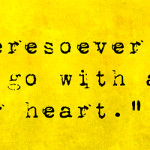
Most adult grief support group attendees have been primary caregivers for their parents or spouses. Generally they are physically and emotionally exhausted—and oddly disoriented because suddenly the 24/7 need for making lists and monitoring medications and meals is over.
I remember one woman in group saying “It’s like I was fired! Like I’ve lost my job! I don’t know what to do with all of the time.”
It is not unusual for caregivers to be more stressed than the person dying
While the group’s immediate focus is on the deep despair of loss, eventually some of the members open up and share how difficult it was to care for their physically ill or memory-impaired loved one—while keeping their own thoughts, feelings and needs to themselves.
Often they wondered if they could make it through another day.
Many would have accepted outside help, but their loved one wouldn’t allow it. To make matters worse, their loved ones often felt that failing physically and/or mentally gave them permission to be demanding and sometimes abusive.
My mother’s long death almost killed my dad
When my mother went from functioning—in spite of chronic pulmonary problems—to three years of steroids (which changed her personality), oxygen and regular trips to hospital emergency rooms, my dad refused to ask for support at home.
Instead he took care of her, the house, meals, laundry and errands. Career military, he was trained to tolerate stress and yo-yoed between expecting things to get better and dreading they never would.
Living thousands of miles away, I was assured by phone that everything was not great, but they were doing well. When I visited, my mother said little, and my dad left no space for me to intervene.
After my mother’s death, he was too proud to admit he was an emotional and physical wreck. Thankfully he had developed a relationship with a nun from their local hospital and she was able to do what I couldn’t: she got him into a hospital grief group and convinced him to schedule an appointment with his physician.
It took him a year to accept her death, and three years to regain his health. In retrospect it is amazing he didn’t die before my mother. That said their life together didn’t need to end this way. My mother would have gladly accepted outside help to relieve my dad of the most difficult physical tasks, and they would both have been better off.
Home Health Care/Hospice Sponsored Transitions Programs
Most home healthcare and hospice agencies now offer family caregiving/transitions support even if the patient is still receiving treatment. The programs are free and funded by large corporate and private donations.
How does Transition Care Work?
A trained professional meets with the family to assess their needs, schedule services and coordinate other community resources to support the entire family. The core of transition support is a group of trained volunteers who provide
- phone check-in
- medical advocacy
- transportation
- caregiver respite
- household and errand assistance
- light food prep, and
- companionship for person with a life-limiting illness.
I have never spoken to an individual who regretted signing up for transition support. Just having a few hours per day to schedule self-care and connect to friends and family members can feel like a gift for the caregiver.
If you are currently in a caregiving role and your loved one is resistant, consider scheduling a preliminary one-on-one in-home visit—anyway. It is not uncommon for the client to change his/her mind and look forward to the service provided. It is also not unusual for strong relationships to develop as the client finds they are more comfortable talking about their personal and emotional challenges with someone who is not a family member.
TalkingGrief.Com’s next post: Caregiving: Part Two. How does a caretaker take care of themselves and set boundaries without feeling guilty?






























